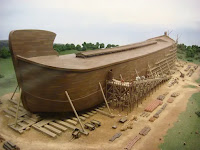Abraham Intercedes for Sodom
So the men turned from there and went toward Sodom, but Abraham still stood before the LORD. Then Abraham drew near and said, “Will you indeed sweep away the righteous with the wicked? Suppose there are fifty righteous within the city. Will you then sweep away the place and not spare it for the fifty righteous who are in it? Far be it from you to do such a thing, to put the righteous to death with the wicked, so that the righteous fare as the wicked! Far be that from you! Shall not the Judge of all the earth do what is just?” And the LORD said, “If I find at Sodom fifty righteous in the city, I will spare the whole place for their sake.”
In the Old Testament we have times when the Second Person of the Trinity (In the New Testament He is named Jesus), appears. The Theologocial term for the appearance of God is called a “Theophany.” In the above passage we have an example of a Theophany. Abraham is visited by “three men” and quickly seeks to provide food and shelter for them (typical in the Mideast). But, Abraham treats them and honors them as Deity. These “three men” are a Theophany of the Trinity. Note the way they are referred to earlier in this chapter. They go from the plural to the singular. The go from three “men” to “the Lord.” Note:
They said to him, “Where is Sarah your wife?” And he said, “She is in the tent.” The LORD said, “I will surely return to you about this time next year, and Sarah your wife shall have a son.” And Sarah was listening at the tent door behind him.
The text reads that “they” (the three “men”) spoke to Abraham about his wife Sarah. Then we read “the LORD said,” something to Abraham. This is one of the rare times in the Old Testament that we have a “Theophany” of the Trinity.
The essence of the above passage, however, not only tells us that God appeared in human form to men in the Old Testament, He also entertained their request. The Theophany, earlier, revealed to Abraham that He was about to destroy Sodom and Gomorrah. That is the town that Abraham’s nephew, Lot, lived in with his wife and two daughters. Abraham, in deep reverence, asked the LORD, if there were 50 righteous people in these cities, if He would spare the city. The LORD receives the request and agrees that if there were only 50 righteous people He would not destroy the city. If we read the entire passage we see that Abraham asked the LORD five more times and whittles his request down to just ten righteous people. The LORD agrees to not destroy the city if there were only ten. (However, there are not even ten and we read later the two cities are destroyed, but not before Lot is rescued by the LORD, Himself.)
The point to be made here is that God is approachable and in fact, typically, approaches us, first. The Theophany approached Abraham. The Triune-Theophany revealed to Abraham what He was going to do. In return, Abraham prayed for his nephew. This is how God works in our lives. When we read God’s Word we are given insights into God’s ways, His movements, His plans and His desires for us and others. We know God is going to destroy those who reject His Son, Jesus. It is revealed to us throughout Scripture. We can, in turn, take that revelation and come to God and pray for those we love, as Abraham did for Lot, to be rescued from God’s wrath. Our prayers ought not to always be about us and our needs. But, that God will spare those we love from His certain wrath. God is NOT obligated to rescue them, but if God does rescue them, it starts with our request to do so. Prayer moves God to show mercy on those we love.















